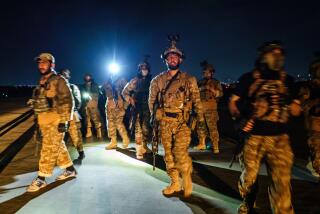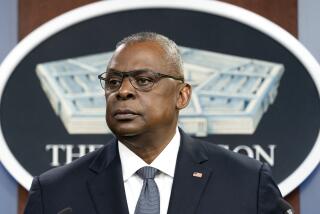Petraeus advisor predicts changes in Afghan strategy
- Share via
The Obama administration’s official position on the impact Gen. David H. Petraeus will have on the war in Afghanistan is minimalist. His appointment doesn’t mean a change in strategy, officials say — just more “unity of effort” in the struggle to make counterinsurgency work. After all, Petraeus was a coauthor of the strategy his predecessor, Gen. Stanley A. McChrystal, was pursuing.
But that doesn’t mean there won’t be real change. In a war that hasn’t been going notably well, there ought to be. And Petraeus is a different general from McChrystal — not merely more practiced at politics and diplomacy but also more likely to focus on those aspects of the war.
For an unofficial forecast, I turned to David Kilcullen, a former Australian army officer who has been an advisor to Petraeus since 2005. Kilcullen, now a consultant to U.S. foreign aid agencies, said he had been in contact with the general last week, but he emphasized he was speaking only for himself.
“The absolutely critical thing we haven’t done very well,” Kilcullen said, “ is come up with a political strategy to take an illegitimate government and turn it into a legitimate one.”
Kilcullen predicts that Petraeus will focus on pushing Afghanistan’s inconstant president, Hamid Karzai, “on government accountability, government reform [and] government human rights abuses.”
The U.S. has been asking Karzai for reform, of course, but only as one of several priorities. Putting reform first, Kilcullen argues, would be a “change in strategy.”
“Now the [ NATO] strategy says the aim is to extend the reach of the Afghan government,” he said. “Thank God we haven’t been very successful…. We would have extended the reach of a government people don’t like.”
That means more pressure on Karzai in private — even though, in public, Petraeus will continue praising the Afghan president. Look for Petraeus to quietly hold up chunks of American aid until selected parts of the government do his bidding, a technique the general perfected as U.S. commander in Iraq.
“One of his greatest strengths was his ability to deal with a bunch of Iraqi politicians who weren’t planning to do the right thing; he forced them to,” Kilcullen said.
Karzai “has been treating us as if he’s got us over a barrel,” he said. “He’s a guy who will be hanging from a lamppost a month after we leave if we don’t protect him.”
Another change: Petraeus is likely to ease the restrictions that have made it difficult to attack suspected Taliban targets from the air — without changing the basic rules that make protecting civilian lives a top priority.
“The rules have been interpreted too restrictively,” Kilcullen said. “They’ve been too legalistic — and also too apologetic.” That’s a significant statement from a man who has condemned U.S. drone attacks in Pakistan for causing civilian casualties, and whose latest book, “Counterinsurgency,” lists “respect for noncombatants” as a fundamental principle of irregular warfare.
One more important change Kilcullen recommends: Both Petraeus and Obama need to make it clearer that there won’t be a wholesale U.S. withdrawal from Afghanistan beginning in July 2011.
Obama took a step in that direction when he named Petraeus as his new commander last month. “We didn’t say we’d be switching off the lights and closing the door behind us,” the president said. “We said that we’d begin a transition phase.”
Petraeus went two small steps further last week. The July 2011 date, he said, applies only to the “surge forces,” the 30,000 troops that Obama approved last year on top of almost 70,000 already in Afghanistan. And he said his support for a drawdown was based on “conditions that we hoped we’d obtain” — leaving his options open if those conditions are not achieved. In that case, it may be the president who has a problem — not the general.
“Successful counterinsurgency, on average, takes about 12 to 15 years,” Kilcullen warned. “ It’s inherent in the time it takes to build government institutions.”
“We’ve already been there nine years,” he noted. How much more time is needed? “About four and a half years,” he estimated — meaning the end of 2014.
Of course, Kilcullen added, there is an alternative — but it isn’t any faster. “If we don’t get it done, we leave on the same timeline,” he said. “But unsuccessfully.”
More to Read
Sign up for Essential California
The most important California stories and recommendations in your inbox every morning.
You may occasionally receive promotional content from the Los Angeles Times.











